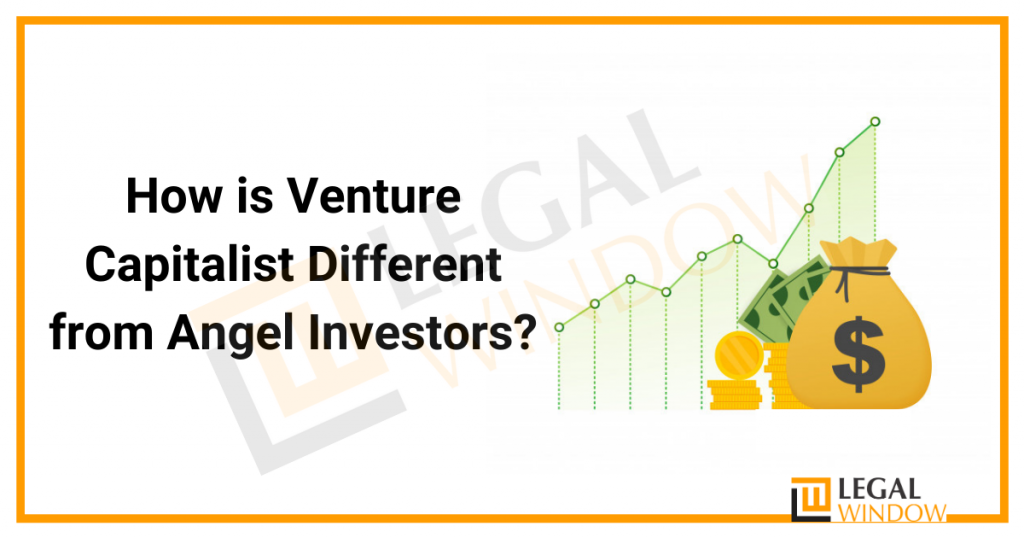How is Venture Capitalist Different from Angel Investors? Read on to find out
- April 16, 2021
- Startup/ Registration
To settle on the correct choice for funding your start-ups, you should know the difference between venture capitalists and angel investors, and what each can proffer. Independent ventures and start up organizations exist in a thrilling financial environment that provides a lot of chances to striving entrepreneurs. Contingent upon the idea of a business and its demands, there are various approaches to draw in the capital. A few new companies start with funds from loved ones until the point when they feel ready to seek after different wellsprings of capital. Some attempt public support or apply for a business loan.
| Page Contents |
Background of Angel Investors and Venture Capitalists
Angel investors and venture capitalists are two of the most common alternative sources of funding. Innovative start-up firms are both addressed by angels and venture capitalist firms, both of them tend to prefer technology and science companies. That said, the disparities between venture capitalists and investors are quite substantial. Angel investors are rich persons who invest their own money in companies. Venture capitalists are employees of risk capital companies who invest other persons’ money in companies.

How is Venture Capitalist Different from Angel Investors?
Before discussing the points of difference between Angel Investors and Venture Capital, let us first try to understand what they actually are. Both are investors, but they differ in their motives, investment plans, and involvement with the investee companies.
Angel Investors
The High Net Worth Individuals (HNI) who are professional investors and have a fair share of knowledge of the industry. They utilize this knowledge to identify potential businesses and they invest in them in their early formative stages. Angel investors are actively involved in investment decisions. Sand sometimes for the investments they make they accept shares in the business. They occasionally also provide their seasoned advice to the investee organizations.
Venture capitalist
Unlike angel investors, venture capitalist first collects money from different investors. Such investors can either be Indian or foreign, individuals, foundations corporations, etc. Venture capital firms are a group of professionals like investors, custodian, authorities managing investment decisions, etc. They deal with a large number of investments. They are not interested in the businesses in their formative years, but they identify entities with high growth potential and invest a huge amount of money with an objective to make a profit with their growth.
Key Differences between Angel Investors and Venture Capital
Both venture capitalist and angel investor firms take into account resourceful start-up businesses, and both are liable in general to incline toward organizations identified with science and technology. That being stated, there are various essential contrasts between venture capitalists and angel investors. Keep reading to know the differences:
- Angel investor work on their own whereas venture capitalists are a division of an organization. Angel investors, also known as business angels, are successful business people who put their own funds in a start-up. They usually resource into high-potential organizations in return for a fair stake. Given that they are contributing their very own cash and there is dependably an innate threat, its profoundly impossible that an angel investor will put resources into an entrepreneur who is not happy to give away a fraction of their organization.
- Venture capitalists are usually a group of financial specialists or organizations rather than an individual. Their investment will drive from people, partnerships, annuity funds, and establishments. These shareholders are known as limited partners. Common partners are the individuals who work closely with the entrepreneurs or founders; they are in charge of dealing with the store and ensure the organization is growing strongly.
- They contribute diverse sums. In case you are investigating the likelihood of moving toward a financial speculator or a heavenly attendant speculator, you will require a precise thought of what they will have the capacity to give fiscally. Frequently, heavenly attendants contribute somewhere in lakhs in Indian money of their own cash, however often they contribute pretty much. At the point when angel investors meet up in a gathering, they may average more than lakhs. Though angel investing is a, for the most part, speedy resolution, you ought to take note that, in light of their moderately constrained monetary limit, heavenly attendant financial specialists can’t generally fund the full capital prerequisites of a business. Investors, then again, put a normal of million out of an organization.
- They have distinctive obligations and inspirations. Angel investors are principally there to offer budgetary help. Though they may give guidance in the event that you request, or acquaint you with significant contacts, they are not indebted to do as such. Their involvement relies upon the desires of the organization and the angel investors’ own tendencies. A venture capitalist watch for a solid product or service that holds a high benefit, a skilled management team and a broad prospective market. When venture capitalists are persuaded and have contributed, it is then their job to help fabricate fruitful organizations, which is the place they include true worth. Among different zones, a venture capitalist will help with regards to building up an organization’s focal point and enlisting senior management. They will be close by to exhort and go about as experienced board for CEOs. This is all with the point of helping an organization profit and turns out to be increasingly fruitful.
- Angel investors put resources only in start-up companies. Angel investors have some expertise in early-stage organizations, financing the late-phase improvement and early market entry. The investment an angel investor provides can have a significant effect with regards to getting an organization ready for action. A venture capitalist will likewise be anxious to put resources into a business with a demonstrated reputation that can show it has the stuff to succeed. The venture capitalist at that point offers to subsidize to take into consideration fast improvement and development.
- They vary in due diligence. Due diligence is an audit of a potential investment that has incited a great deal of discussion for angel investors throughout the years. A few angel investors do no due diligence – and they are not undoubtedly, given that all the cash is their own. Be that as it may, it has been revealed that when angel investors do somewhere around 20 hours of due diligence, they are multiple times bound to see a positive return. Venture capitalists need to accomplish increasingly due diligence; given that they have a guardian duty to their restricted partners. Venture capitalists can expend in a surplus of 50-70 lakhs with regards to looking into their speculation prospects. These are the most utmost differences between venture and angel investors, and the choice of which to pick is exceptionally in an entrepreneur’s hand.
Takeaway
There used to be a time when the difference between an angel investor and venture capitalist (VC) was more clear. But these days the lines can be blurred. With more companies seeking financing, and with more financing platforms to fund those companies, it’s sometimes hard to differentiate. You’ll hear terms like “seed investor,” “angel investor,” “accelerator,” or “venture capital firm.” But where does a “family office” or “crowdfunding platform” fit in? Are they angel investors or VCs? Or somewhere in-between? With so many funding sources in the ecosystem, it’s easy to get confused about your options.
We hope we were able to clarify some of these terms and the key differences between the two main investor groups, angel investors and VCs, examine their differences and similarities, pros and cons, and then answer some of the common questions people ask about each.
LegalWindow.in is a professional technology driven platform of multidisciplined experts like CA/CS/Lawyers spanning with an aim to provide concrete solution to individuals, start-ups and other business organisation by maximising their growth at an affordable cost. Our team offers expertise solutions in various fields that include Corporate Laws, Direct Taxations, GST Matters, IP Registrations and other Legal Affairs.
Categories
- Agreement Drafting (23)
- Annual Compliance (11)
- Change in Business (36)
- Company Law (147)
- Compliance (88)
- Digital Banking (3)
- Drug License (3)
- FEMA (17)
- Finance Company (42)
- Foreign Taxation (6)
- FSSAI License/Registration (14)
- GST (117)
- Hallmark Registration (1)
- Income Tax (199)
- Latest News (34)
- Miscellaneous (164)
- NBFC Registration (8)
- NGO (14)
- SEBI Registration (6)
- Section 8 Company (7)
- Start and manage a business (20)
- Startup/ Registration (126)
- Trademark Registration/IPR (40)
Recent Posts
- Understanding the provisions of GST Audit and Adjudication April 20, 2024
- April, 2024 Tax Compliance Tracker: Income Tax & GST Deadlines April 18, 2024
- Managing Director & Whole Time Director in a Private Limited Company April 17, 2024
About us
LegalWindow.in is a professional technology driven platform of multidisciplined experts like CA/CS/Lawyers spanning with an aim to provide concrete solution to individuals, start-ups and other business organisation by maximising their growth at an affordable cost.







